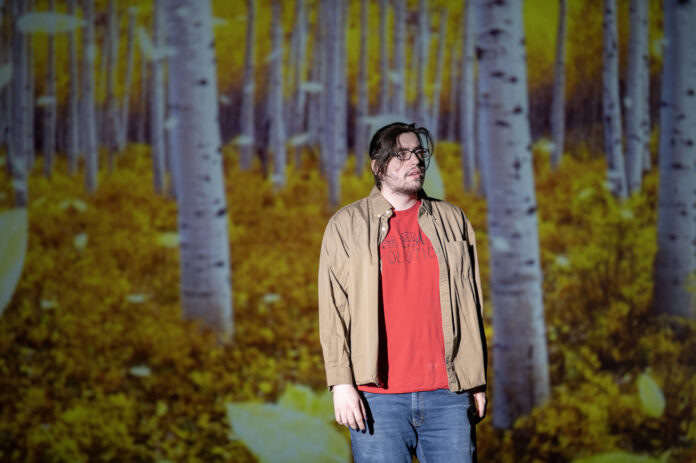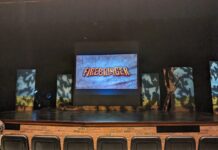“Pando” is a new play dubbed a “philosophical comedy” written by Brad Poer, who can often be found directing shows and teaching various Humanities and Theatre classes at Kellogg Community College. The show premiered for the very first time in KCC’s Binda Auditorium and opened on Friday, March 15. The show that I attended was on Saturday, March 16 at 7:30 p.m. – the rest of the performances can be caught on Friday, March 22, and Saturday, March 23 at 7:30 p.m. and Sunday, March 24 at 3:00 p.m. Tickets are $10 for students, seniors, and veterans and $15 for the general public.
Poer described the show as six one-act plays set in different video game universes. Some of these universes are vague ideas of common game genres while others are immediately recognizable such as “Critter Junction: Fresh Vistas.” I found it very amusing to review the paper program with my brother before the start of the show and attempt to decipher what specific games were being referenced and whether or not we had played them before.
The show isn’t just about slaying enemies and collecting fruit, however – Poer sneaks in plenty of scenes that will have you laughing and tearing up in the same breath. The show is full of lessons that children need to learn and adults need to be reminded of, while also addressing the cycles of life that many people fear. The cast and crew of “Pando” are doing everything they can to avoid spoilers to draw in curious minds, so all I will say is that if the rest of the audience felt the same way I did, we left with a sense of comfort knowing that we are not alone in our anxieties and that doing your best is often the best thing you can do.
The cast of “Pando” is made up of nine “avatars” who serve as various characters throughout the show, Players 1 and 2 who are playing the games we see unfold on stage, and an all-knowing entity that uses the endearing nickname “love” unsparingly. I also found the stagehands interesting – oftentimes the point of their all-black clothing and stealthiness is so that they go unnoticed and unheard to the audience, but “Pando” embraces the crew as we see them don ninja costumes and move or even act as set pieces right out in the open. As someone who has done a fair share of shows throughout my life, I appreciated the extra attention granted to crew members who often don’t get recognition from the crowds.
The show even included a bit of participation from the audience. This can always be tricky since a lot of people won’t volunteer to participate because of stage fright or possible embarrassment, but in “Pando” it was used sparingly and in a way that added another layer of connection between the audience and cast members without requiring anyone to actually get up on stage and make a fool of themselves (even though that can be fun sometimes, too). I really appreciated this, as between that, the avatars in the background doing their own little skits, and the unique script style where actors are allowed and encouraged to improvise and switch up their lines, you can notice many different things and see many different versions of this show every single time you go.
Do I have a bit of bias? Of course. I’ve been seeing KCC shows since I was 11 years old, and was in one of them not too long ago. You’ll even see that two of the cast members share my same last name. However, I wholeheartedly believe that even if I had seen this show with no prior experience in KCC theatre I would’ve enjoyed myself thoroughly.
Every cast member is given their chance to stand out, and the mix between being a supporting character and being a key component in a game universe is relatively even. I saw an awesome mix of new actors and people I’ve seen in these shows for years be loved by the audience alike, and even heard cheers for Avatar 6’s character “Jeff” during the well-deserved standing ovation. The actor afterward told me he was surprised they remembered his “small” character’s name, but I believe that that is proof the actors’ choices made an impact on the audience even when they didn’t expect them to, which is a testament to the amount of talent this cast packs.
One thing I immediately noticed was the lighting and projections and how they aided the story rather than the story relying on them fully. One of my biggest theatre pet peeves is the newer phenomenon of having little to no set and pretty much all background projections. While the set for “Pando” wasn’t elaborate or huge, it served its purpose well while allowing the flexibility of switching game universes that the show requires with a mix of lighting tricks, projections, physical set pieces, props, and stage mechanics that are all very effective.
Costumes mostly consisted of different colored jumpsuits for the avatars that were personalized with pins, patches, and other accessories – when I asked if they got to design their own jumpsuits, I was met with an excited, “Yes we did!”
From witnessing their interactions online and on stage I have gotten the strong impression that the cast and crew of “Pando” have created a close-knit creative environment, one where they are free to be themselves and simply have fun crafting this piece of art that obviously has a profound meaning to them all.
There’s also the fact that the price of your ticket will go towards bringing down of the cost of KCC Theatre’s upcoming Scotland trip, where they will perform “Pando” for audiences during the Fringe Festival in August of 2025. You’re not only in for two hours of fun video game references when you go to see “Pando” this weekend – you’re in for lessons that will leave you pondering and knowing that you’re helping the cast take this show on a once-in-a-lifetime trip to share it’s joy. It’s not a show you’ll regret seeing, love.


























